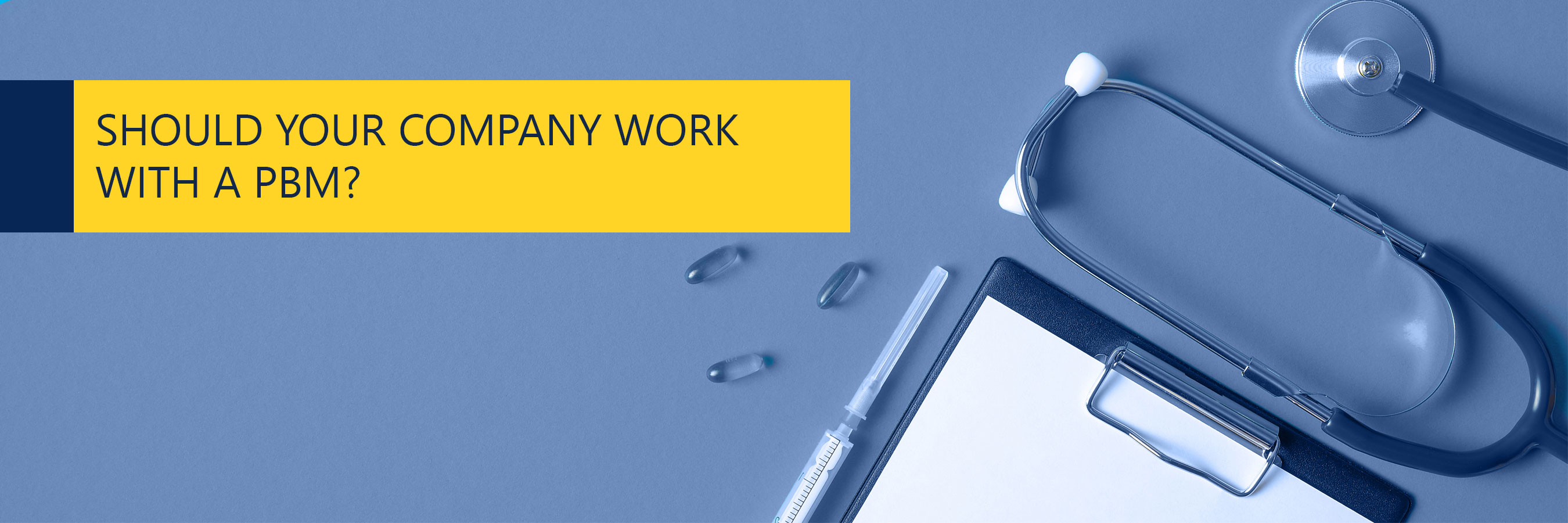
More than likely, your company already works with a PBM, or pharmacy benefits manager, but if you’re unfamiliar with this type of agency, then it’s likely your health insurance carrier manages this relationship. It’s important to know what a PBM is and what your options are for working with one because PBMs can save your company money and offer your employees better pricing and access to prescription drugs.

Looking at a PBM from a high-level, they act as a connection between employers, health insurance companies, pharmacies, drug manufacturers, and patients. But, PBMs do so much more than just interface with pharmacies and manufacturers. As a third-party administrator they maintain formularies, negotiate drug prices, and handle anything and everything to do with prescription drugs for a health insurance plan.
Think of PBMs like a mediator between the people who make prescription drugs and the people who take them. Accounting for all the factors in between, PBMs work hard to ensure patients have access to the drugs they need at accessible prices through a series of negotiations and programs to mitigate rising drug costs.
On a practical level, a PBM is the agency that provides the list of covered drugs for the insured, often in a tiered pricing program. If you’ve ever worked with a large health insurance carrier that acts as their own PBM or has an exclusive contract with a PBM, then you might have only seen that list in the context of a health insurance plan. For many employers, that means a PBM only works behind the scenes.
But for those that work with a PBM outside of their health insurance carrier, the interaction likely looks very different. Because PBMs manage anything and everything to do with prescription drug benefits, an employer who works independently with one will see how much oversight and care is delivered not just in cost but in compliance, administration, and quality of prescription drugs.
When we talk about working with a PBM independently or through a health insurance carrier, we’re talking about carve-out vs. carve-in, where carving-out refers to contracting a PBM outside of the company’s health insurance carrier and carving-in refers to working with a health insurance’s PBM.
The greatest advantage to carving-in is that it consolidates medical insurance vendors for the employer. But that consolidation means less transparency and customization. Carve-in plans are designed as one-size-fits-all and employers have no options to participate or opt-out of the programs that PBMs use to regulate costs.
Carve-out plans have several advantages because the employer can work directly with the PBM to find the exact plans and benefits that work for their employees and the company’s budget. The relationship offers far more transparency, and employees generally prefer carve-out PBMs because they are often given access to claims and administration that is hidden within carve-in plans.
Some large insurance carriers require medical and pharmacy benefits to be integrated, which means the employer has no option for a carve-out plan. However, if your medical benefits plan allows for carve-out, then here are the factors to consider when choosing whether to carve-out and who to carve-out with:
ProAct, Inc. is the largest employee-owned PBM, providing high-touch services to companies since 1999. We offer a 24/7/365 helpline and a national pharmacy network so that your employees will always have access to the care they need any time day or night. We pride ourselves on acting like an extension of your team – a true business partner with only your best interests in mind. To learn more, reach out to us at 888.254.3552 or online.





